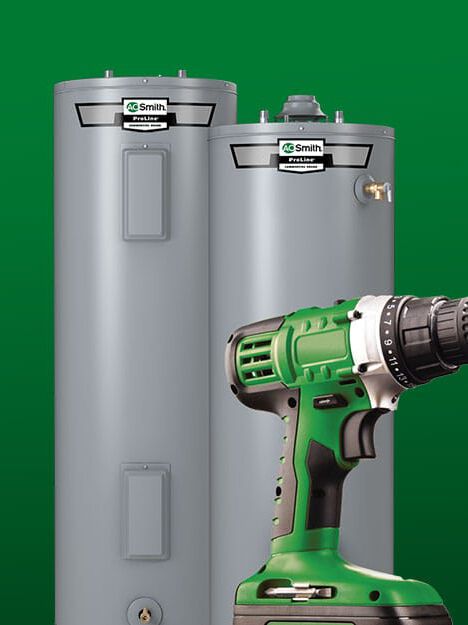
Why Is My Water Heater Leaking?
How to Diagnose, Fix, and Prevent Water Heater Leaks
Table of Contents
Is your water heater leaking, or do you suspect it could have a leak? This is a common problem that can significantly impact the operation of your system and needs addressing promptly.
From faulty drain valves to loose connections, there are many faults and issues that cause your water heater to start leaking. Early and accurate diagnosis can help you get your water heater back in perfect working order and keep water damage to a minimum.
This comprehensive guide covers how to diagnose a leaking water heater, what causes a water heater to leak, and the steps you can take to get your water heater working efficiently again. It provides all the information you need to arrange water heater repair or replacement and prevent leaks.
Common Reasons for Water Heater Leaks
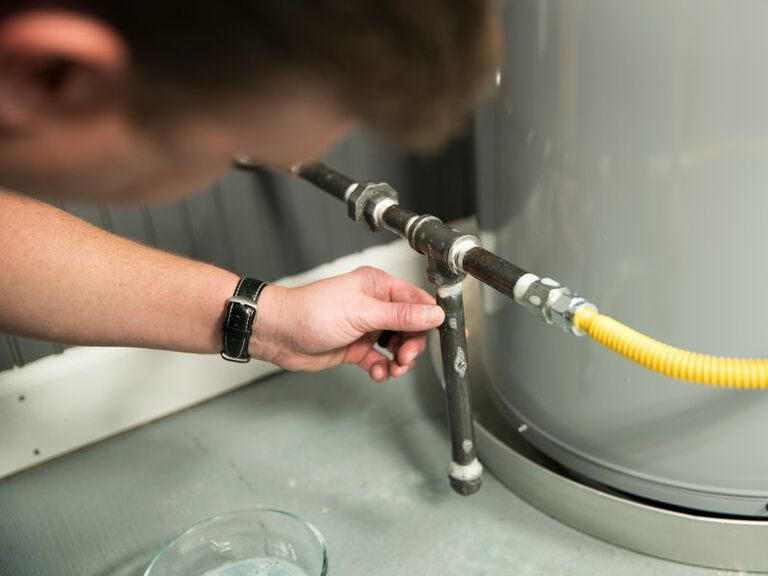
Water leaks can occur for many reasons and appear out of the blue or build up over time. Knowing some of the common culprits can help you diagnose the source and severity of the leak and either fix it yourself or call in the professionals.
Loose Pipe Connections
Loose pipe connections can occur over time due to thermal expansion and general wear and tear. These loose connection points can start leaking water and require tightening or replacement.
Faulty Drain Valve
When the drain valve is loose or faulty, it can cause leaks. This issue is usually fixed by tightening the valve or replacing the component if it's beyond repair.
Hard Water
The minerals in hard water can accumulate over time, causing corrosion and leaks. This type of corrosion cannot be repaired and will eventually require tank replacement.
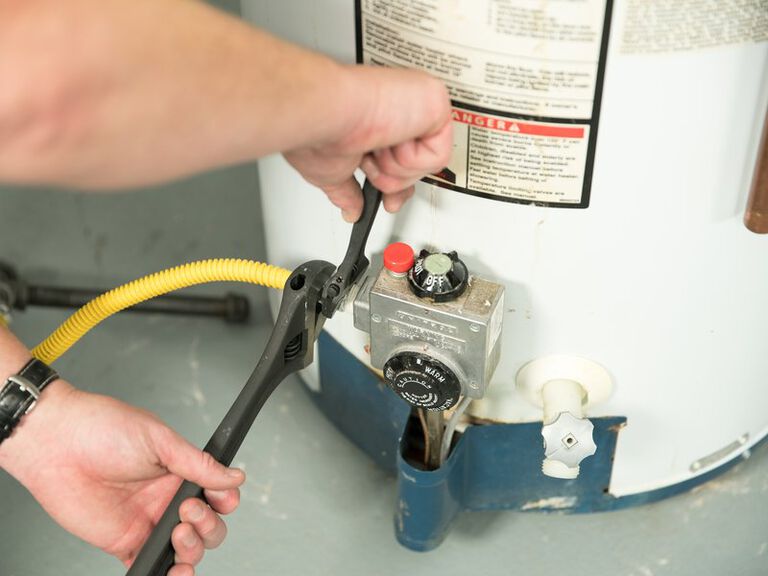
Old Water Heater
Water heaters typically last between 8 and 20 years, depending on the type. As the components in old water heaters begin to deteriorate, leaks can occur. In most cases, it is more cost-effective to replace an old water heater than repair it.
Cracked Tank
Tanks can develop cracks due to corrosion or stress from water pressure. A cracked tank will typically result in a full replacement of the water heater.
Water Pressure Is Too High
Excessive water pressure can put undue stress on the water heater, leading to leaks in the tank or at plumbing connection points. Installing a pressure-reducing valve or an expansion tank can resolve the problem.
Dissipated Anode Rod
The anode rod, or "sacrificial" rod, corrodes over time to protect the tank from rusting. These rods usually last 3-5 years before they need to be replaced.
Sediment Collection
Hard water contains minerals that can collect at the bottom of your tank and cause overheating, cracks and leaks. If your water heater is leaking from the bottom, the problem could be excess sediment. This can be prevented with regular flushing.
Signs Your Water Heater Is Leaking (or Is About to Leak)
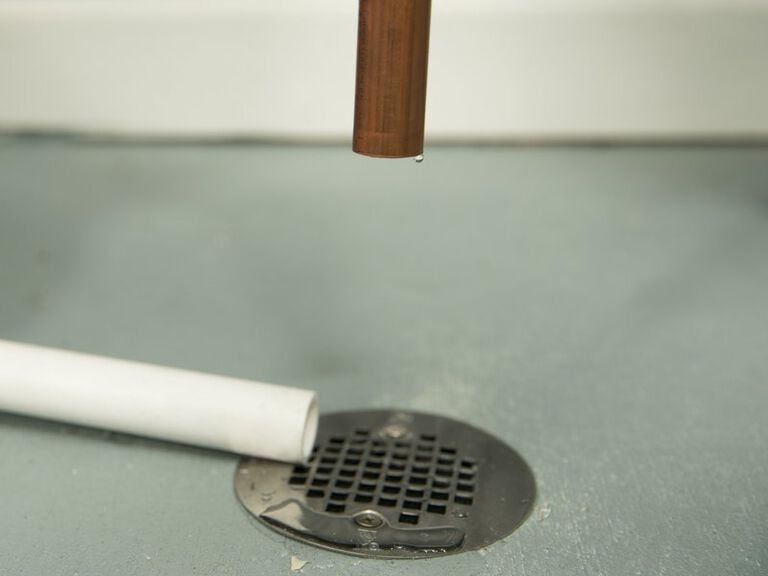
If you're in the right place at the right time or know just enough about water heaters, you may be able to stop a water leak in its tracks. For example, you may hear odd noises coming from your system that alert you of a problem. Here are some of the common signs of an imminent leak or leak in progress and tips on how to fix and manage the problem.
Puddles and Wet Spots on or Around the Heater
Puddles or damp spots near your water heater are clear signs that it is leaking. Closer inspection may reveal the leak to be coming from the tank itself or loose plumbing connections.
Leaks During Operation
If your water heater is leaking while in operation, this can indicate a more specific problem, such as a faulty T&P valve or internal tank issues.
Poor Water Quality/Changes in Water Quality
Changes in water quality, such as rust, cloudiness, or a metallic smell, can indicate sediment buildup or corrosion inside your water tank. These issues could eventually lead to a leak and are typically a sign that your system needs to be maintained or replaced soon.
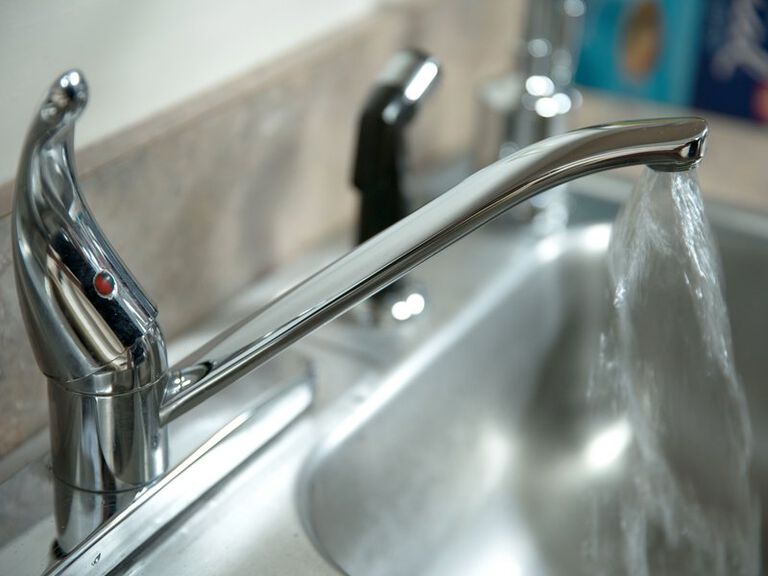
Loud or Abnormal Sounds
One of the first signs your water heater is in trouble is strange sounds coming from the system. Sounds can range from rumbling or popping to loud cracking and are usually a sign that sediment has built up in the bottom of the tank. As this sediment is heated and reheated, it can cause the metal to become weak and eventually crack and leak.
Should I Repair My Leaky Water Heater?
Whether you choose to repair or replace your water heater depends on the severity of the leak and the age and condition of your unit. It's also important to consider the potential risks associated with water heater leaks.
Home Damage
One of the biggest risks of a leaking water heater is the potential for water damage. Even a small leak can lead to significant water damage over time, affecting floors and walls and creating the perfect environment for mold to grow.
Poor Water Heater Performance
A water heater leak can have a significant impact on performance. You might notice your water isn't heating up adequately or is taking a long time to heat. You might also notice a spike in your energy costs as your system uses more energy to get water to the desired temperature.
Whether you suspect your water heater is leaking or about to leak, it's important to take action as quickly as possible. In doing so, you could prevent complete failure of components and avoid extensive water damage.
Diagnosing & Fixing Water Heater Leaks
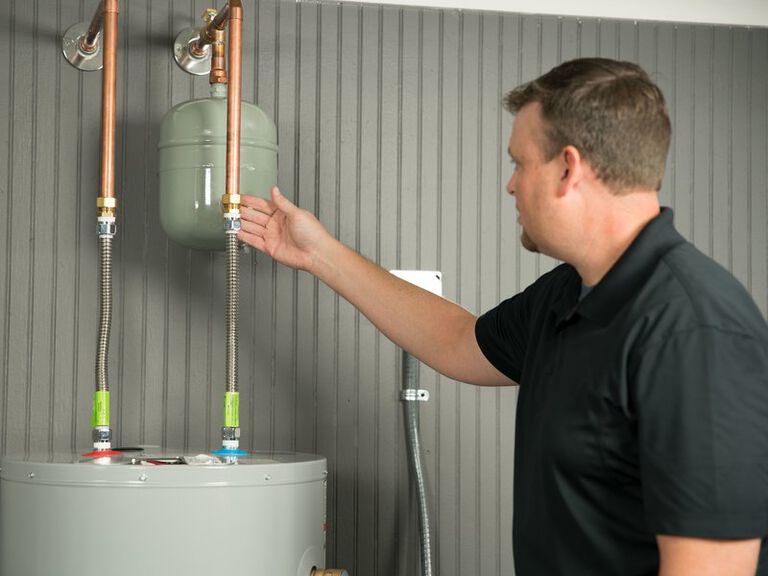
If you have a leaking water heater, it's important to approach the problem with care. While some basic troubleshooting is possible, for safety and an accurate diagnosis, it is always best to arrange a visit with an authorized service provider. Here are some tips for diagnosing water leaks. You can also check the manual for your particular model for advice and support.
Step 1: Ruling Out Condensation
When is a leak not a leak? When it's condensation. Condensation forming on a water heater is often mistaken for a leak somewhere. Here's how to tell the difference.
Condensation on an Electric Heater
On electric heaters, condensation can occur when the cold water in the tank cools the outer surface in a warm environment. This is normal and usually resolves as the heater warms up. This will generally not be seen since due to the insulation around the tank.
Condensation on a Gas Heater
Gas heaters may experience condensation when cold water enters the tank or when the burner fires after a period of inactivity. This is typically temporary and not a cause for concern.
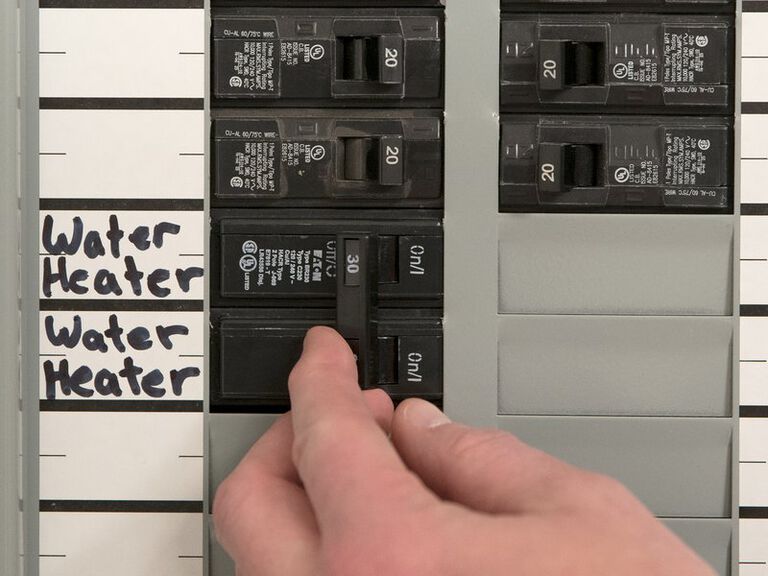
Step 2: Turn off the Power or Gas Line
For safety, ensure that the power or gas supply to the water heater is turned off before any inspection.
Turning off the Breaker
Locate your home's electric panel box, and switch off the breaker connected to the electric water heater.
Closing the Gas Shut-Off Valve
If you are confident in doing so, find the gas shut-off valve near the water heater and turn it to the off position.
Step 3: Turn Off The Water Supply
Turn the water supply off to prevent any further leakage while you diagnose the problem. This can be done by turning off the dedicated shut-off valve on the cold water line leading to the heater.
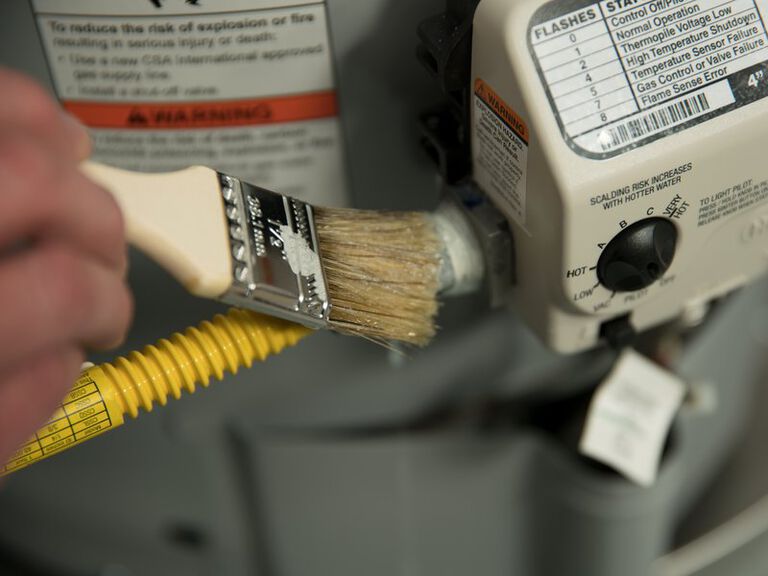
Step 4: Find the Source of the Leak
Identifying where the leak is coming from can help in understanding the severity of the problem.
Leaks at the Top
If the leak is coming from the top of your heater, inspect the pipe fittings and connections. Sometimes, tightening these connections can take care of the problem.
Leaks at the Side
Leaks coming from the side of your system often originate from the T&P relief valve. These leaks are often caused by excessive temperature or pressure and and can be resolved by identifying why the T&P relief value leaked in the fist place.
Leaks at the Base
A water leak coming from the base of the heater is often the first indication of a serious problem. This issue is often seen in tank models and may be caused by a serious internal problem, such as a corroded tank. In these circumstances, it's usually more practical and cost-effective to replace than repair.

Step 5: Fixing the Leak
If you've managed to find the source of the leak and it looks like an easy fix, follow the tips below. If you don't feel confident in fixing the problem yourself, call an authorized professional.
Tighten Pipe Fittings
If the leak is at a pipe fitting, try gently tightening it with a wrench. Be careful not to tighten too much, as this could damage the fitting and make the leak worse.
Adjusting the T&P Valve
If the T&P valve is leaking due to high pressure, turning down the thermostat could stop the leak. The addition of a properly sized and charged expansion tank is the solution to this issue.
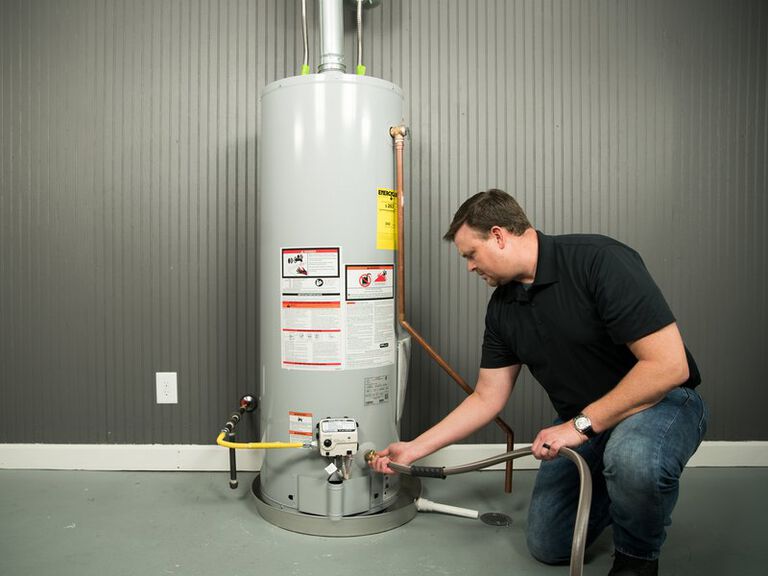
Replacing the T&P Valve
If the T&P valve is broken and causing a continuous leak, it will need replacing. This involves draining the tank, removing the old valve and installing a new one.
Turn Down the Cold Water Pressure
If high water pressure is causing problems for your water heater, you could consider installing a pressure-reducing valve on your main water line.
Replacing the Drain Valve
If the leak is coming from the drain valve because it's not closing properly, replacement is usually the best solution.
Replacing the Water Heater
In cases of severe leaks, like those from a corroded tank, the most practical solution is often to replace the entire water heater. Choosing the right water heater to suit your needs is important for performance, efficiency and longevity. An authorized professional can give you the best advice on choosing your next system.
Preventing Water Heater Leaks
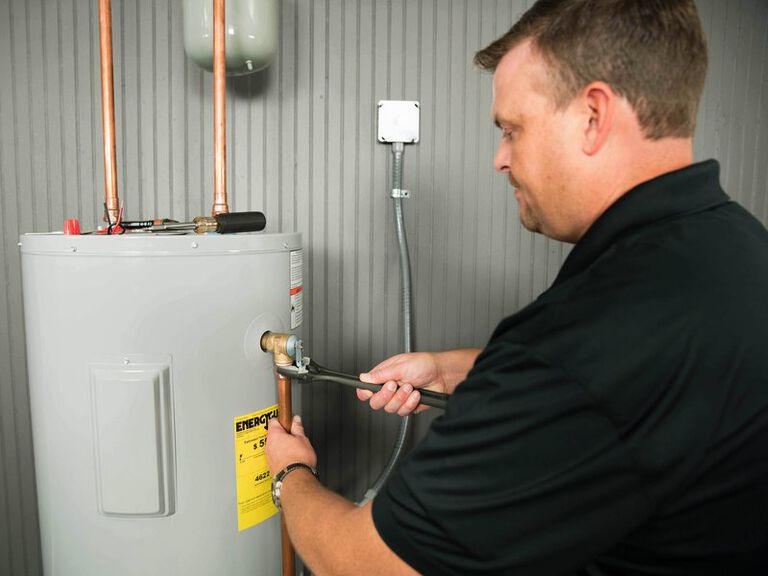
Preventative maintenance is key to avoiding leaks and ensuring your water heater operates at its best. Arranging regular maintenance also gives you peace of mind that your system is performing optimally.
Follow the Recommended Maintenance Schedule
Regular maintenance that follows the manufacturer's recommended schedule will keep your water heater in prime condition. Tune-ups also help keep your energy costs in check, keep your warranty valid and prolong the life of your system. Typical maintenance tasks include annual flushing to remove sediment, checking and replacing the anode rod and testing the T&P valve.
Regularly Inspect Components for Leaks and Corrosion
Carry out regular inspections of your water heater. Look out for signs of corrosion, leaks or damage. Pay attention to valves, connections, and the tank itself if your water heater has one. Early detection of these problems can prevent major problems and breakdowns from occurring in the future.
If your water heater is leaking, an early and accurate diagnosis can help prevent a complete breakdown and extensive water damage. If your system is beyond repair, a suitable replacement will give you years of dependable and efficient performance.
Frequently Asked Questions
If your water heater is leaking, immediately turn off the power or gas supply and shut off the water supply to prevent further damage. Check if the moisture is condensation rather than a leak, then locate the source. Leaks from the top often come from loose pipe connections that can be tightened, while leaks from the T&P valve may indicate high pressure. Leaks from the base usually signal serious tank damage requiring replacement. Contact an authorized service provider for safety and accurate diagnosis.
No, you should not continue using a leaking water heater. Even small leaks can cause significant water damage, create mold conditions, and indicate problems that will worsen over time. A leaking unit also performs poorly and uses more energy. Turn off the power and water supply immediately, then contact a professional to diagnose and repair the issue before using the unit again.
Yes, a leaking water heater should be treated as urgent and requires immediate action. Even minor leaks can quickly cause significant water damage and mold problems. Leaks indicate potential component failure that could worsen rapidly, and delaying repairs increases the risk of complete system failure. Turn off power and water supply immediately and contact an authorized service provider, especially if you notice large puddles or leaks from the tank base.
Yes, turn off your water heater immediately if it's leaking. Switch off the breaker for electric models or close the gas shut-off valve for gas models. Then turn off the water supply using the shut-off valve on the cold water line. This prevents further leakage, reduces water damage risk, and makes it safe to inspect or wait for a professional. Never attempt repairs while the unit has power and water connected.


